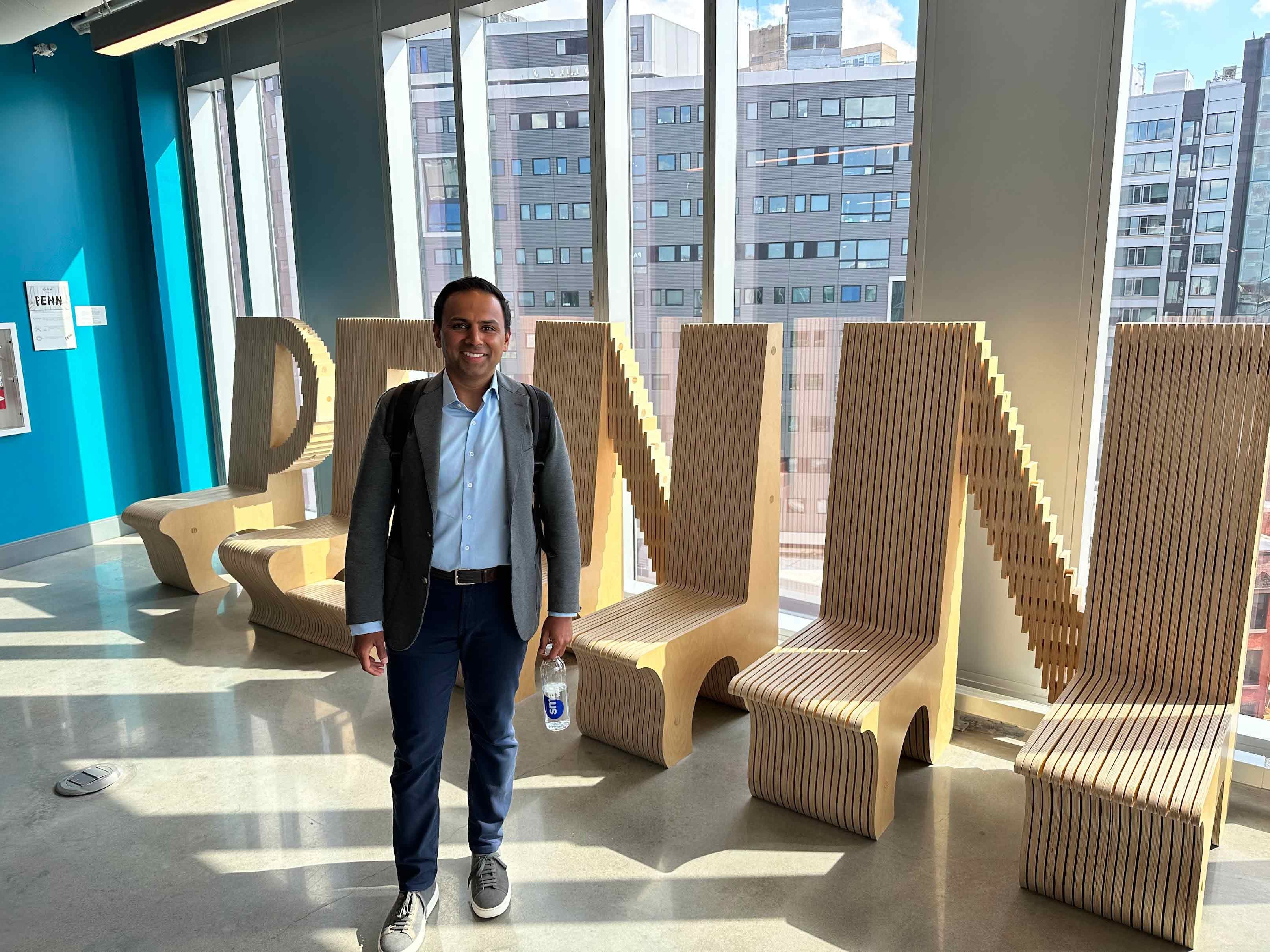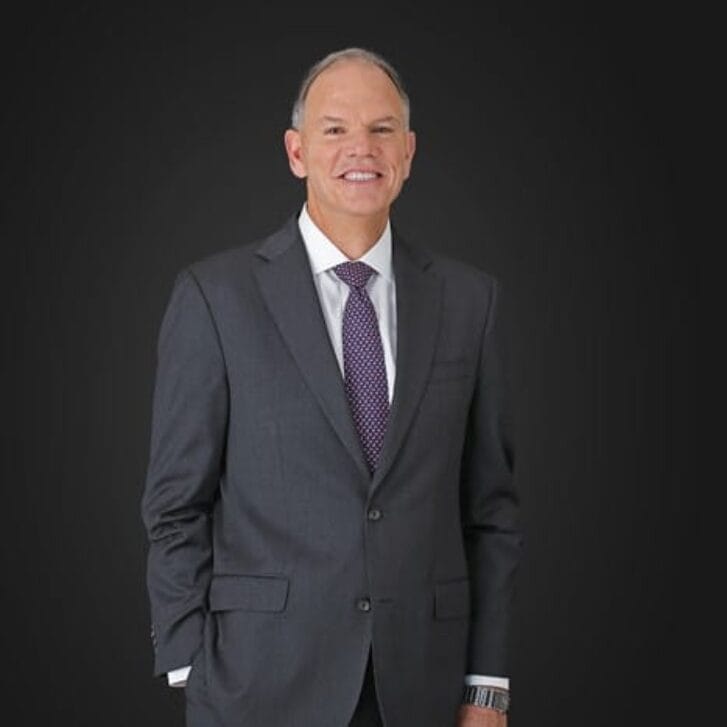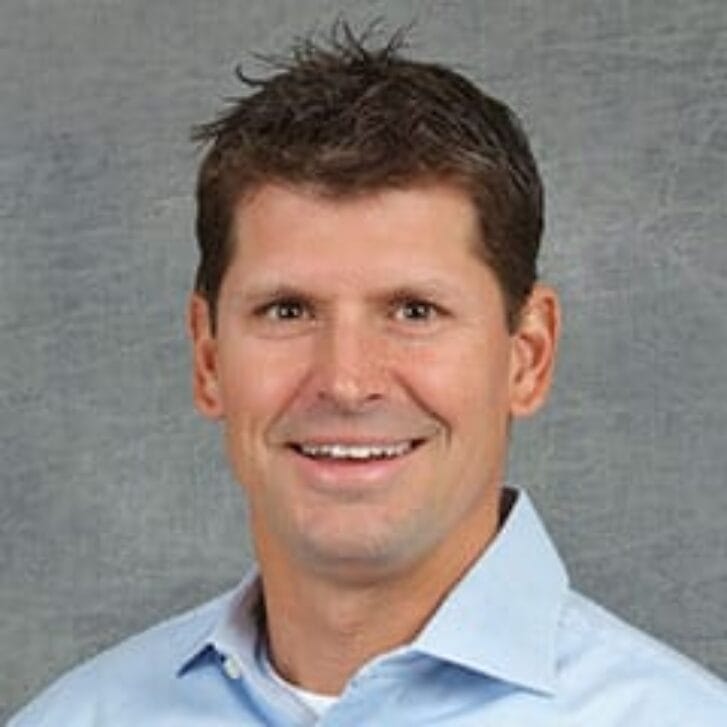When passers-by look through the full-length blue-tinted windows of Tangen Hall, it might be hard to believe they’re in front of an academic building on Penn’s campus. Laser cutters, 3D printers, soldering irons, and even hammers are used in its classrooms by Wharton students experimenting with their latest inventions. Since it was finished in 2022, this “maker space” has presented a unique opportunity for alumni to empower future entrepreneurs while cementing their own legacies.
Amish Jani W99 WG00 is no stranger to supporting early-stage ideas. For the past 20 years, he has guided startups such as Shopify and Brooklinen to success. Drawing from his experience with founders at his company Firstmark, Jani wanted to support a testing ground in Tangen Hall for student builders and creators.

Amish Jani W99 WG00 visited Tangen Hall after it was completed in 2022.
“When I spent time in school, we certainly did software; we built websites,” says Jani, the namesake of the Amish Jani and Sapna Jani Digital Realization Lab. “But being able to see that you can take a concept and an idea, create it on a screen, and then have that manifest in your hand so quickly creates a level of inspiration that I think is really powerful.”
Just around the corner from Jani’s lab on the ground floor of Tangen Hall is another newly dedicated room — The V. Dunaevskiy Fabrication Lab. Svetlana Dunaevskaya WG06 named the lab in honor of her late father Vitaly, a former engineer and dean of a vocational college in Russia.

Clockwise from top left: Svetlana Dunaevskaya WG06 with her sister Ludmila Dunaevskaya, mother Elena Dunaevskaya, and father Vitaly Dunaevskiy.
“He was very passionate about education,” says Dunaevskaya, director at Virya Advisors, a venture capital firm. “If you ask my kids what they remember about my dad, they remember that he always fixed everything. Everything I know how to [fix is] because of my dad. So that’s why when his lab was there, I was like, ‘Wow, that’s exactly what he would have loved.’”
Both Dunaevskaya and Jani were inspired by the kaleidoscopic nature of Tangen Hall, which is home to the Venture Lab — a partnership between Penn Engineering, the Stuart Weitzman School of Design, and Wharton, known as “the nucleus of entrepreneurship” on campus.
“One of the things I love about Penn is they’ve got such excellence across such a wide variety of disciplines,” says Jani, who took advantage of computer science courses while he was an undergraduate at Wharton before submatriculating into the MBA program. He continues to use his unique alumnus perspective in his role with the Undergraduate Executive Board and is impressed with the resources and connections students have today. “That’s the beauty of this space within the overall Tangen Hall concept. I hope someone from nursing shows up with an idea for a prosthetic. I hope someone from mechanical engineering shows up with an idea for a different type of part. What you want is that meeting of the minds. And I think the future of a lot of advancements are going to be interdisciplinary in nature.”
Dunaevskaya would agree: “Basically, no matter which part of the university you’re in, you see a way of using this lab, which is great. My dad also loved bringing people together, so it’s perfect.”
She witnessed this collaborative spirit firsthand when visiting the Fabrication Lab with her 15-year-old daughter in July 2022, when they were “blown away” to see students coming together to work on projects involving the massive 3D printer. But for Dunaevskaya, now based in Singapore, the lab provides a deeper sense of comfort — a reminder of home for her international family.
“In Russian culture, we go back to our ancestors. We actually go to the graves and remember them once a year. It’s not possible for us, because we haven’t been to Russia in a long time now,” says Dunaevskaya, whose family also spent six years in India. With her daughter starting to think about college, uprooting back to the U.S. is a strong possibility. For others in Wharton’s global network who are frequently on the move, Dunaevskaya says, dedicating a space on campus can be a meaningful way to give back — “for someone who wants to find that anchor somewhere and say, ‘Even if my physical base is not in that particular place, I have that relationship which will basically last me a lifetime.’”


























